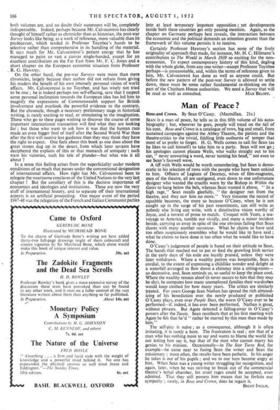Man of Peace ?
Rose-and Crown. By Sean O'Casey. (Macmillan. 21s.) SEAN is a man of peace, he tells us in this fifth volume of his auto- biography ; but, wherever he goes, people will tread on the tail of his coat, Rose and Crown is a catalogue of rows, big and small, from sustained campaigns against the Abbey Theatre, the pietists and the theatre-critics to the trivial, fiddling little outbursts of temper that most of us prefer to forget. H. G. Wells comes to call for Sean (as he likes to call himself) to take him to a party. Sean will not go ; his apologies cannot placate Wells, who walks straight out to his car, " never answering a word, never turning his head," not even to see Sean's farewell wave.
A tiff with Wells would be worth remembering, but Sean is demo- cratic in his selection of rows with the people who have been unkind to him. Officers of Legions of Decency, wives of film-magnates, men of the theatre, all are castigated, even down to one unfortunate designer who wanted the crucifix worn by the Bishop in Within the Gates to hang below the belt, whereas Sean wanted it above. " In a high rage," Sean recalls gleefully, " the designer ran from the theatre, and they saw him no more." Very tiresome the record of squabble becomes, the more so because 0 'Casey, when he is not caught up in the surge of his past resentments, can still write as nobody else living can write, with a dinstinctive vision worthy of Joyce, and a torrent of prose to match. Croquet with Yeats, a sea- voyage to America, tumble out vividly, and many a minor incident beside, carrying us away in spite of the one obvious failing that Sean shares with many another raconteur. What he claims to have said too often suspiciously resembles what he would like to have said ; what he claims to have done is too often what he would like to have done.
O'Casey's judgement of people is based on their attitude to Sean.
The hands that reached out to pat or feed the growling Irish terrier in the early days of his exile are loyally praised, unless they were later withdrawn. Where a wealthy patron was hospitable, Sean is cordial, to the extent of expressing a childlike wonderand delight at a waterfall arranged to flow down a chimney into a sitting-room- so decorative, and, Sean reminds us, so useful to keep the place cool. Where the wealthy remain aloof (it never occurs to him that they may be shy), he computes how many unemployed families their wardrobes would keep clothed for how many years. The critics are similarly treated. For years George Jean Nathan has spread the rich almond- icing of his benediction over the newly produced or published O'Casey plays, even over Purple Dust, the worst O'Casey ever to be performed—if, indeed, it has ever been performed, Nathan is great, without phrases. But Agate detected a falling-away in O'Casey's powers after the Tassie. Sean recollects that at his first meeting with Agate he felt that he'd " rather be marred by this man than made by him."
The self-pity is naive ; as a consequence, although it is often irritating, it is rarely a bore. The frustration is real ; not that of a man who has nothing more to say and wants to blame the world for not letting him say it, bet that of the man who cannot marry his genius to his mission. Occasionally—in The Star Turns Red, for example—he came near to fusing Sean the writer and Sean the missionary ; more often, the results have been pathetic. In his anger he takes it out of his pupils ; and we in our turn become angry at him. When Sean was a young writer struggling for recognition, and again, later, when he was striving to break out of the commercial theatre's lethal chamber, his cruel rages could be accepted, even admired. That they still possess him means that he forfeits our sympathy ; rarely, in Rose and Crown, does he regain it.
BRIAN INGLIS.


























 Previous page
Previous page